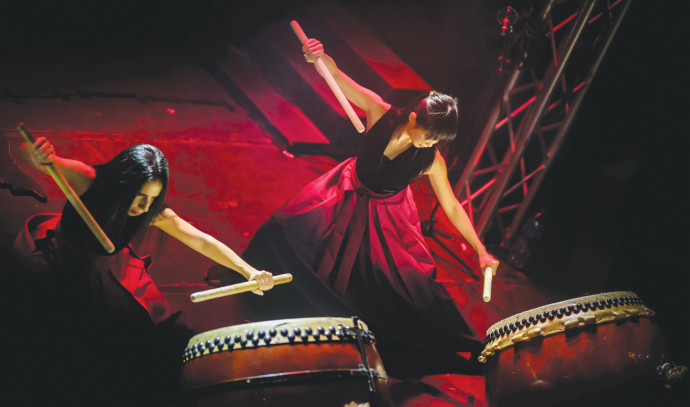Nitay Zelinker keeps fit, physically and emotionally. And while he’s at it, he produces some enticing sounds and rhythms and makes a crust in the process. Zelinker engages in the ancient art of taiko drumming. In fact, that’s a mite tautologous. In Japanese, “taiko” means drum.
So what brought a young student from the Ben Gurion University of Beersheba to try his luck with a drumming troupe ensconced in a remote spot in the Far East? And what will we hear and see at Japan’s Giant Taiko Drums – A Family Show on May 10 (5 p.m.), as part of this year’s Felicja Blumental Festival, which takes place at the Tel Aviv Museum of Art from May 8-13.
Twelve years ago, Zelinker was a medical laboratory sciences student at the aforementioned southern institute of higher learning. At the time, he was feverishly cramming the night before an exam but things were not running too smoothly. Considering his initial thoughts on the field, perhaps it wasn’t too surprising that he arrived at an impasse. “I decided to take on university studies. I wanted to do something related to the medical field, although I didn’t want to invest all that effort in becoming a doctor. I didn’t think I would eventually work in a medical laboratory, maybe I’d work in alternative medicine, but I also wanted to have the experience of being a student, in Beersheva, and not being too close to home,” he recalls. Getting away from Tel Aviv was one thing, but navigating his way through a study program that wasn’t entirely to his liking was another.
As he sweated over his textbooks and lecture notes, his mind roamed to a very different cultural clime. “I just couldn’t concentrate on the material,” he says. “Then I remembered a documentary I once saw called The Drummers, about drummers in Taiwan. Every time I heard them drumming I cried. It moved me so much. It was like listening to an orchestra.” He just couldn’t shake that off and he began fantasizing about hooking up with the said troupe.
He also got a gentle loving push in the desired direction. “I called my sister, Noa, and told her how I was feeling and she said I should go for it,” he adds.
Zelinker’s musical road
THAT IS exactly what he set out to do, although there was plenty of toing and froing along the way. Mind you, Zelinker did have some relevant collateral to lay on the negotiating table. “I come from a very musical family,” he notes. “My mother played double bass with the Israel Chamber Orchestra. Everyone plays and sings in my family.”
Zelinker’s musical road actually began even before he was out here as a corporeal breathing being. “She played bass to me while I was still inside the womb,” he laughs. The youngster soon got into music himself. “I had lessons on all sorts of instruments: violin, piano, saxophone, trombone,” he intones. “I loved music. I went to lots of concerts, which I enjoyed a lot, but I couldn’t find an instrument that would allow me to express myself the way I really wanted. Maybe, the trombone was the closest I got to that.”
There was another side, more feral, to Zelinker’s youthful ambitions. “I did a lot of martial arts. That was really my first love. I did judo, capoeira, kung fu and that sort of thing. My dream was to be the first Israeli to be accepted to a Shaolin monastery in China and to train with them. Then I found out someone had already beaten me to that,” he laughs.
Zelinker saw a natural connection between his two loves. “Martial arts are not the same as music, but music has power, too,” he says.
That nocturnal struggle with his studies eventually led him to combine sonic creation with immense physical exertion, with taiko drumming. But it wasn’t easy getting there. “I remembered that documentary I’d seen years before, which showed that the drummers combined meditation in nature, martial arts and playing music together. That was something that really appealed to me.”
Somehow he tracked down the U-Theatre group that appeared in the movie and he began emailing them. “It was a miracle that they replied at all,” he says. However, it wasn’t the response he’d been hoping for. “They said they wouldn’t accept me and I shouldn’t bother coming to Taiwan.”
But Zelinker was sold on the idea and kept emailing the drummers until he wore them down. “I think they were worried I was going to be a burden and they were going to take care of me. I said I would care for myself and contribute in any way I could. They were also looking for some financial support from me,” he laughs. “I told them I didn’t have any money but I would help, run errands and anything else they needed.”
Too old for drumming
THERE WAS another mark against the applicant from Beersheba University. “I was 26 years old at the time and they don’t normally accept anyone over the age of 25. Taiko is physically very demanding.” After seeing the veteran Kodo drumming troupe from Japan perform, some years ago, in Jerusalem, I can vouch for that.
In time, Zelinker wore the U-Theatre folk down. “They said I needed discipline, so I told them I’d been in the Israeli army.” I was in shock, to begin with, when they turned me down. I thought that maybe it isn’t the way we’d also been told: follow your heart and the doors will open and the universe will help you,” he chuckles.
He bought a plane ticket and embarked on the initial phases of training, which included such testing rites of passage as walking while meditating for months on end. He also studied Chinese at a local university that not only facilitated his communication with the drummers, it also led to love. It was there he met his partner, Mahu Sato, who had come over from her native Japan to study Chinese. Love flourished while Zelinker spent three years perfecting his taiko skills with the group. “I didn’t think I’d stay so long,” he recalls.
He subsequently relocated to Japan. That presented its own challenges. “The Taiwanese approach to taiko is very different from the Japanese,” he explains. “The Taiwanese approach is about letting go of the ego and everything else. The Japanese method is about putting more and more effort into it. It is never enough.”
After 18 months in Japan, Zelinker and Sato returned to Israel and set about establishing Taiko Life Israel, which performs all over the country and is training the next generation of taiko drummers. The current band – naturally enough – includes Zelinker’s mom, Orit, who combines her bass playing with drumming, Einat Chitayat who was born in Japan to Israeli parents, and Miho Kataoka who plays a traditional Japanese bamboo flute called a shinaboe, as well as Sato and Zelinker.
The Taiko Life concert at the Felicja Blumental Festival will demonstrate the traditional drumming art form, seasoned here and there with some Western and other colors and textures, including piyut – Jewish liturgical music – and, of course, some of the personal and cultural baggage each member brings to the dynamic percussive fray.
For tickets and more information, visit: https://fbmc.co.il/en/festival/felicja-blumental-festival.



